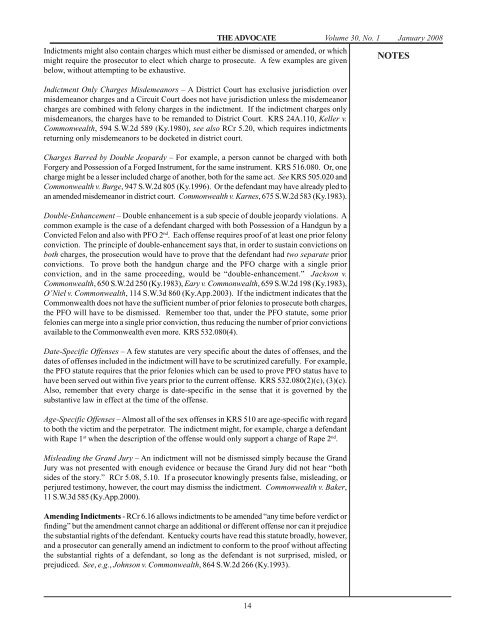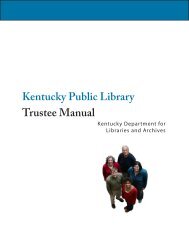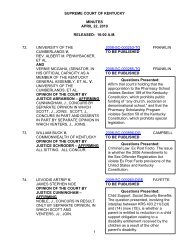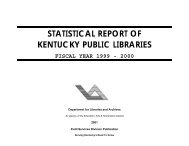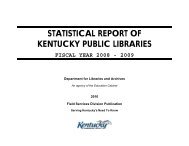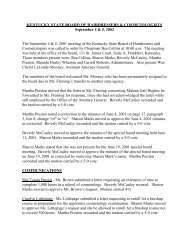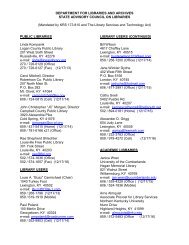Jan08 Advo.pmd - e-archives Home
Jan08 Advo.pmd - e-archives Home
Jan08 Advo.pmd - e-archives Home
You also want an ePaper? Increase the reach of your titles
YUMPU automatically turns print PDFs into web optimized ePapers that Google loves.
THE ADVOCATE Volume 30, No. 1 January 2008<br />
Indictments might also contain charges which must either be dismissed or amended, or which<br />
might require the prosecutor to elect which charge to prosecute. A few examples are given<br />
below, without attempting to be exhaustive.<br />
Indictment Only Charges Misdemeanors – A District Court has exclusive jurisdiction over<br />
misdemeanor charges and a Circuit Court does not have jurisdiction unless the misdemeanor<br />
charges are combined with felony charges in the indictment. If the indictment charges only<br />
misdemeanors, the charges have to be remanded to District Court. KRS 24A.110, Keller v.<br />
Commonwealth, 594 S.W.2d 589 (Ky.1980), see also RCr 5.20, which requires indictments<br />
returning only misdemeanors to be docketed in district court.<br />
Charges Barred by Double Jeopardy – For example, a person cannot be charged with both<br />
Forgery and Possession of a Forged Instrument, for the same instrument. KRS 516.080. Or, one<br />
charge might be a lesser included charge of another, both for the same act. See KRS 505.020 and<br />
Commonwealth v. Burge, 947 S.W.2d 805 (Ky.1996). Or the defendant may have already pled to<br />
an amended misdemeanor in district court. Commonwealth v. Karnes, 675 S.W.2d 583 (Ky.1983).<br />
Double-Enhancement – Double enhancement is a sub specie of double jeopardy violations. A<br />
common example is the case of a defendant charged with both Possession of a Handgun by a<br />
Convicted Felon and also with PFO 2 nd . Each offense requires proof of at least one prior felony<br />
conviction. The principle of double-enhancement says that, in order to sustain convictions on<br />
both charges, the prosecution would have to prove that the defendant had two separate prior<br />
convictions. To prove both the handgun charge and the PFO charge with a single prior<br />
conviction, and in the same proceeding, would be “double-enhancement.” Jackson v.<br />
Commonwealth, 650 S.W.2d 250 (Ky.1983), Eary v. Commonwealth, 659 S.W.2d 198 (Ky.1983),<br />
O’Niel v. Commonwealth, 114 S.W.3d 860 (Ky.App.2003). If the indictment indicates that the<br />
Commonwealth does not have the sufficient number of prior felonies to prosecute both charges,<br />
the PFO will have to be dismissed. Remember too that, under the PFO statute, some prior<br />
felonies can merge into a single prior conviction, thus reducing the number of prior convictions<br />
available to the Commonwealth even more. KRS 532.080(4).<br />
Date-Specific Offenses – A few statutes are very specific about the dates of offenses, and the<br />
dates of offenses included in the indictment will have to be scrutinized carefully. For example,<br />
the PFO statute requires that the prior felonies which can be used to prove PFO status have to<br />
have been served out within five years prior to the current offense. KRS 532.080(2)(c), (3)(c).<br />
Also, remember that every charge is date-specific in the sense that it is governed by the<br />
substantive law in effect at the time of the offense.<br />
Age-Specific Offenses – Almost all of the sex offenses in KRS 510 are age-specific with regard<br />
to both the victim and the perpetrator. The indictment might, for example, charge a defendant<br />
with Rape 1 st when the description of the offense would only support a charge of Rape 2 nd .<br />
Misleading the Grand Jury – An indictment will not be dismissed simply because the Grand<br />
Jury was not presented with enough evidence or because the Grand Jury did not hear “both<br />
sides of the story.” RCr 5.08, 5.10. If a prosecutor knowingly presents false, misleading, or<br />
perjured testimony, however, the court may dismiss the indictment. Commonwealth v. Baker,<br />
11 S.W.3d 585 (Ky.App.2000).<br />
Amending Indictments - RCr 6.16 allows indictments to be amended “any time before verdict or<br />
finding” but the amendment cannot charge an additional or different offense nor can it prejudice<br />
the substantial rights of the defendant. Kentucky courts have read this statute broadly, however,<br />
and a prosecutor can generally amend an indictment to conform to the proof without affecting<br />
the substantial rights of a defendant, so long as the defendant is not surprised, misled, or<br />
prejudiced. See, e.g., Johnson v. Commonwealth, 864 S.W.2d 266 (Ky.1993).<br />
14<br />
NOTES


